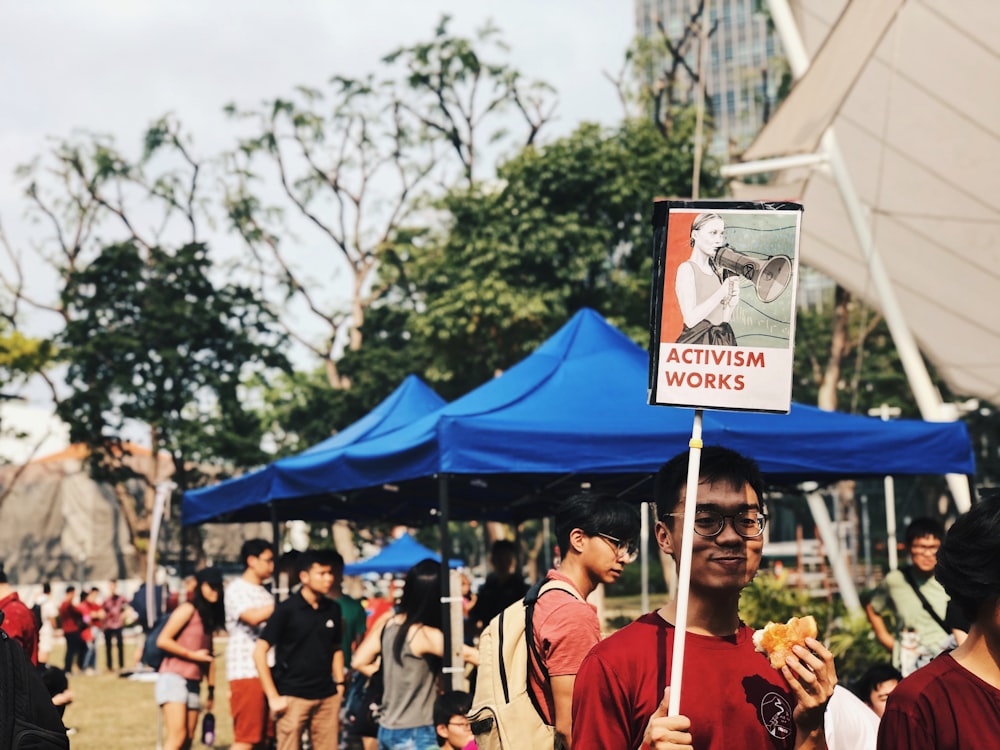Media Skills for Engaged Youth
Topic outline
-
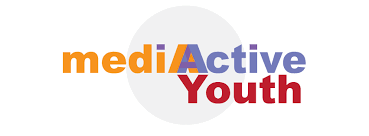
Online course ‟Media Skills for Engaged Youth – how to create engaging social media content‟ is an interactive, multilingual (English, Spanish and Serbian) online Moodle course that supplements the one on media literacy and equips the participants with practical skills and knowledge required for them to write, create, post and share media messages in the form of articles, short videos for social media and creating a YouTube channel.
For centuries, the ability to produce printed and media content belonged to a privileged few with access to education and technology to do so. Nowadays, anyone can publish almost everything within minutes. But, is this journalism, or stating opinions, citizens’ activism, or policymaking? This course is primarily intended for those young people and youth workers wishing to create media content to express themselves, advocate their attitudes, fight for their goals and inspire and induce positive social change.
The goal of this course is thus to offer engaging and inspiring content with the two-fold purpose: 1) to teach participants how to use the media as a tool for activism and social change; and 2) to have participants become effective media activists (agents of change) themselves.
These subjects are covered within three main clusters. The first one, Are you Stylish? contains a practical guide to style, composition and good usage that underscores all good writing. It will provide practical advice for avoiding typical stylistic and grammar mistakes in writing and exemplify elementary rules of style, composition and good writing. This section will also offer instructions, “tricks” and how to about structuring an argument, achieving clarity and cohesion, being specific and concrete in writing, developing stylistic elegance and grace etc.
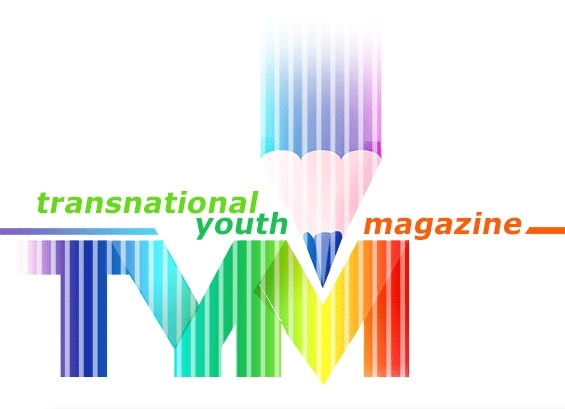 The
second cluster focuses on acquiring the knowledge needed to actively participate in new media forms - in particular, how to write articles, including some tips and sources about investigative, responsible journalism and journalist ethics, and a tutorial on how to make a YouTube channel. It also contains a link to our rebranded Transnational Youth Magazine (TYM), where you can read about youth issues but also publish your articles.
The
second cluster focuses on acquiring the knowledge needed to actively participate in new media forms - in particular, how to write articles, including some tips and sources about investigative, responsible journalism and journalist ethics, and a tutorial on how to make a YouTube channel. It also contains a link to our rebranded Transnational Youth Magazine (TYM), where you can read about youth issues but also publish your articles.Finally, the third section on Youth Media Activism will provide short and inspiring stories and case-studies about the most influential recent examples of youth activism in/through the media, such as the Kony 2012 campaign, Nobel peace prize winner Malala Yousafzai or environmental activist Greta Thunberg.
Taking this three-part online course will enable the participants to grasp the role and potential of contemporary media and youth activism, as well as to obtain essential and/or improve their existing writing skills. The course thereby aims at equipping the participant with a full range of skills which will enable them to fully, creatively and actively participate in today’s world dominated by information and technology.
-
The first section, Are you Stylish? contains a practical guide to style, composition and good usage that underscores all good writing. It provides practical advice for avoiding typical stylistic and grammar mistakes in writing and exemplifies elementary rules of style, composition and good writing. It covers in more detail basic rules of composition and elementary rules of usage. We will also discuss some basic writing rules, practice using them and test our writing skills.
Lecture Basic Rules of Composition This lecture covers Top 10 basic rules of composition, such as: omit needless words; use definite, concrete, specific languages; keep related words together; make a paragraph into a unit of composition and others. Once fully acquired, these rules help users to avoid many typical mistakes in written English, common even for experienced native users.
Prezi presentation of the lecture can be found here.
-
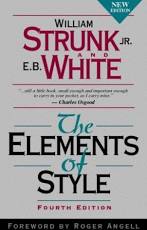 The Elements of Style is a famous short book written by William Strunk and abridged by E. B. White over a hundred years ago. It had numerous editions and is still considered one of the best manuals for good writing in English.
The Elements of Style is a famous short book written by William Strunk and abridged by E. B. White over a hundred years ago. It had numerous editions and is still considered one of the best manuals for good writing in English. Please read carefully the section - Elementary Principles of Composition pp. 26-40.
-
The next topic in this course is the list of the ten elementary rules of good usage, a sort of top ten list of basic grammar rules in English, or the most common mistakes that people usually make. Our source for this is the already mentioned book Elements of Style written 100 years ago by William Strunk and modified half a century ago by Elwyn White.
Prezi presentation of the lecture can be found here.
-
This website contains a list of a number of interactive quizzes on grammar and writing that you can take at will. They cover all the major fields such as: BASIC SENTENCE PARTS, VERBS AND VERBALS, CLAUSES & PHRASES, STRUCTURAL FLAWS, PUNCTUATION & BASIC MECHANICS, PRONOUN USAGE, STYLISTIC CONSIDERATIONS, NOTORIOUS CONFUSABLES, SPELLING, VOCABULARY and GENERAL GRAMMAR quizzes.
-
Writing Skills Test Practice Exam: 45 Minutes—75 Questions
(developed by the Evergreen Valley College)
In the five passages that follow, certain words and phrases are underlined and numbered. In the right–hand screen, you will find alternatives for each underlined part. You are to choose the one that best expresses the idea, makes the statement appropriate for standard written English, or is worded most consistently with the style and tone of the passage as a whole. If you think the original is best, choose “NO CHANGE.”
You will also find questions about a section of the passage, or about the passage as a whole. These questions do not refer to an underlined portion of the passage, but rather are identified by a number or numbers in a box.
For each question, choose the alternative you consider best and click the corresponding button. Read each passage through once before you begin to answer the questions that accompany it. You cannot determine most questions without reading several sentences beyond the question. Be sure that you have read far enough ahead each time you choose an alternative.
-
-

The second cluster focuses on acquiring the knowledge needed to actively participate in old and new media forms - in particular, it offers some more tips on how to write a publishable article and a tutorial on how to make a YouTube channel. It also contains a link to our rebranded Transnational Youth Magazine (TYM), where you can read articles about youth issues from Europe and America, but also publish your articles.
-

Investigative journalism is often defined as a form of journalism in which reporters deeply investigate a single topic of interest, such as serious crimes, political corruption, or corporate wrongdoing.
Organizations of investigative journalists
•IRE (www.ire.org) – for years, it gathers journalists, editors, educators and trainers, as well as student, from USA and worldwide.• the Global Investigative Journalism Network has been established in 2003, with members being invited from all national, regional and continental organizations of investigative reporters.
-
Investigative Journalism Sources:
The Internet offers a number of useful, practical and insightful manuals about investigative journalism, with step-by-step guide on how to find a story, follow it, treat your sources, defining minimal and maximal hypothesis etc.
 Ten Steps to Investigative Reporting By Lucinda S. Fleeson publication by the International Center for Journalists
Ten Steps to Investigative Reporting By Lucinda S. Fleeson publication by the International Center for Journalists"Broaden the Definition of Investigative Reporting
Don’t limit yourself! Investigative reporting includes more than stories that expose corruption and criminal activity. Important and suitable topics include stories that explain how systems work or fail, or reconstruct a complex event. Reporters at many newspapers have found that readers have a great interest in how things work, what is going on, how it may affect ordinary people."
Investigative Journalism, From BIRN’s Probe to Porn Vids, A short article by Serbian Award-winning investigative journalist Branko Čečen (in English)
What is investigative journalism? Publication and website by Konrad Adenauer Foundation (Africa) "By the time you read this chapter and worked through the exercises and reading, you'll know how to:
* Define the practice of investigative journalism; Discuss the mission of investigative journalists and some of the ground rules they need to observe; Discuss the skills and personal qualities investigative journalists need; Identify topics and approaches appropriate for investigative stories; Discuss, critique, and derive pointers from examples of African and other investigative journalism."
The Global Investigative Journalism Casebook, UNESCO series on Journalism Education
"the Casebook serves as a complementary material for training purposes, aiming to enhance the exchange of good practices and networking in investigative journalism throughout the world. It contains more than 20 worldwide recent investigative stories, covering a wide variety of topical subjects and of special interest to UNESCO such as freedom of information, good governance, social and legal issues, the environment, health and gender..., followed by an explanation of how the authors conducted their research and the writing of the piece. Many of the authors belong to the Global Investigative Journalism Network, and the stories exemplify modern techniques and high standards.
 Investigative Journalism: Context and Practice, Edited by Hugo de Burgh
Investigative Journalism: Context and Practice, Edited by Hugo de BurghInvestigative Journalism is a critical and reflective introduction to the traditions and practices of investigative journalism. Beginning with a historical survey, the authors explain how investigative journalism should be understood within the framework of the mass media. They discuss how it relates to the legal system, the place of ethics in investigations and the influence of new technologies on journalistic practices.
ISTRAŽIVAČKO NOVINARSTVO, published by Friedrich Ebert Stiftung in Sarajevo in 2009 (in Bosnian/Croatian/Serbian)
-
In short, fact checking is the way of verifying the truthfulness of a text, sentence, claim, image, footage, clip or any form of media content we’re receiving, producing or publishing.
In this presentation, we will see:
1) What fact checking and fake news are in relation to investigative journalism2) Where to search for reliable information -
Journalism ethics means ethical principles and good practices that journalists should use.

Society of Professional Journalists - SPJ Code of Ethics is one of the most influential and clearest expressions of ethical standards in journalism.
The four pillars of this ethics can be summarized as follows:
SEEK TRUTH AND REPORT IT - Ethical journalism should be accurate and fair. Journalists should be honest and courageous in gathering, reporting and interpreting information.
ACT INDEPENDENTLY - The highest and primary obligation of ethical journalism is to serve the public.
BE ACCOUNTABLE AND TRANSPARENT - means taking responsibility for one's work and explaining one’s decisions to the public.
MINIMIZE HARM - treat sources, subjects, colleagues and members of the public as human beings deserving of respect.
-

The Translational Youth Magazine (TYM) is a rebranded journal emerging from the Mediactive Youth initiative. It contains many texts of your young activists, from dozens of countries worldwide. Some of the young activists had their first articles published here, so we welcome your contribution, irrespective of whether you are a beginner or experienced author.
-
-
The third section on Youth Media Activism will provide several videos about Youth activism, as well as some short and inspiring stories and case-studies about the most influential recent examples of youth activism in/through the media, such as the Kony 2012 campaign, Nobel peace prize winner Malala Yousafzai or Greta Thunberg.
-
In this section of the course, we will talk about Youth activism. Firstly, I will provide some details about Youth Activism in general, and then focus in particular on Youth Activism in the realm of the media. I will discuss issues such as: What is youth activism, why is it important, what forms of youth activism are there, how do young people become activists, how to use social media as a tool for youth activism and so on. We will then go to explore in some detail two representative cases of youth activism. The first case study will be dedicated to a documentary called Kony 2012, which became viral and led to an international intervention intended to bring down a suspected war criminal. The second study case is the story of Malala Yousafzai, the youngest-ever Nobel Prize laureate.
A short opening lecture entitled Youth activism explaining the notion of youth activism.
Powerpoint presentation of the lecture can be found here.
-
 Kony 2012 is a documentary produced by a charity called Invisible children in 2012. The organisation Invisible Children was founded in 2004 by three filmmakers Jason Russell, Bobby Bailey and Lauren Poole to raise awareness and to bring to justice Joseph Kony, who was the leader of the Lords Resistance Army. This paramilitary formation was at the time responsible for the abduction of thousands of children, rape, pillage and it caused the displacement of over a million people in Uganda. In 2005, a year after Invisible Children was formed, Joseph Kony became the most wanted man by the International Criminal Court, and his actions were described as having no ulterior political or ethical motifs except him imposing his brutal power.
Kony 2012 is a documentary produced by a charity called Invisible children in 2012. The organisation Invisible Children was founded in 2004 by three filmmakers Jason Russell, Bobby Bailey and Lauren Poole to raise awareness and to bring to justice Joseph Kony, who was the leader of the Lords Resistance Army. This paramilitary formation was at the time responsible for the abduction of thousands of children, rape, pillage and it caused the displacement of over a million people in Uganda. In 2005, a year after Invisible Children was formed, Joseph Kony became the most wanted man by the International Criminal Court, and his actions were described as having no ulterior political or ethical motifs except him imposing his brutal power. -
Social Media and Youth Activism Lecture address the issue of youth activism in the contemporary IT environment. Some scholars argue that youth activism today is at its lowest points. They emphasize movements such as those in the USA, for example, Black Panthers who fought for the rights of black and oppressed people in America, or student movement and anti-war movement during the Vietnam war. The students were also heavily involved in social justice for the civil rights movement, the women’s liberation movement, and gay rights, as well as environmental issues and freedom of speech, among other things. Today, some say, youth are self-centered, narcissistic and so on, and they take no part in civic participation.
Others think that countless youth are civically engaged and involved in movements outside of traditional
political groups. Kassimir concludes that “our
understanding of contemporary youth activism – local and global, national and transnational – lags woefully behind the political practices of young people… Many young people have found their voices and are speaking up for change”.
So, how are young people using social media as tools for activism?
Facebook and Twitter are used resources for youth activism: technological advancement has necessitated a new way of understanding activism among young people. The nowadays world is being transformed by young people, “but crucially through means and methods that are unfamiliar to adults”.
Powerpoint presentation of the lecture can be found here.
-
 Malala Yousafzai was only 17 when she received a Nobel Prize for peace for her struggle against the suppression of children and young people and for the right of all children to education. Malala was born in the region known as the Swat valley in Pakistan, which is close to the Afghanistan border. Her family ran several schools in the region, and as a girl, she was a good pupil and dreamt of becoming a doctor. Her region had at times shifted under the control of the Taliban, who imposed strict laws in the places that they control and banned the girls from taking education under the threat of punishment or death.A short introductory video about Malala Yousafzai is available here.
Malala Yousafzai was only 17 when she received a Nobel Prize for peace for her struggle against the suppression of children and young people and for the right of all children to education. Malala was born in the region known as the Swat valley in Pakistan, which is close to the Afghanistan border. Her family ran several schools in the region, and as a girl, she was a good pupil and dreamt of becoming a doctor. Her region had at times shifted under the control of the Taliban, who imposed strict laws in the places that they control and banned the girls from taking education under the threat of punishment or death.A short introductory video about Malala Yousafzai is available here.A documentary about Malala called Class dismissed is available here.
In her Nobel lecture, Malala Yousafzai humbly emphasized that she is acting on behalf of thousands, even millions of young girls in the world who are deprived of education, and she also invited several of her young friends from different parts of the world who are fighting for the same thing to be present there during the ceremony. She is currently continuing her struggle and has opened a school for the Syrian refugees in Lebanon, and this school offers education and training to girls between 14 and 18 years of age. As the last part of the story of Malala Yousafzai and the ability of one young person to influence the world, we are giving here her Nobel Peace Prize speech in full.
. -
Greta Thunberg is a Swedish teenage environmental activist who is internationally known for challenging world leaders to take immediate action against climate change. Thunberg initially gained notice for her youth and her straightforward speaking manner,[5] both in public and to political leaders and assemblies, in which she criticises world leaders for their failure to take what she considers sufficient action to address the climate crisis.
After Thunberg addressed the 2018 United Nations Climate Change Conference, student strikes took place every week somewhere in the world. In 2019, there were multiple coordinated multi-city protests involving over a million students each. To avoid flying, Thunberg sailed to North America where she attended the 2019 UN Climate Action Summit. Her speech there, in which she exclaimed "How dare you", was widely taken up by the press and incorporated into music.
Her sudden rise to world fame has made her both a leader and a target for critics, especially due to her age. Her
influence on the world stage has been described by The Guardian and other newspapers as the "Greta effect". She received numerous honours and awards, including an honorary Fellowship of the Royal Scottish Geographical Society, inclusion in Time's 100 most influential people, being the youngest Time Person of the Year, inclusion in the Forbes list of The World's 100 Most Powerful Women (2019), and three consecutive nominations for the Nobel Peace Prize (2019–2021).
Greta's 2019 speech How dare you?I am Greta is a 2020 documentary that follows Greta Thunberg, a teenage climate activist from Sweden, on her international crusade to get people to listen to scientists about the world's environmental problems. Greta Thunberg, 15, starts school striking for the climate. She skips school and sit outside the parliament to show the politicians that if they don't care about her future, why should she? A film about acting to stop climate change before it's too late.
-
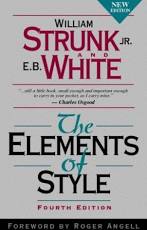 The Elements of Style is a famous short book written by William Strunk and abridged by E. B. White over a hundred years ago. It had numerous editions and is still considered one of the best manuals for good writing in English.
The Elements of Style is a famous short book written by William Strunk and abridged by E. B. White over a hundred years ago. It had numerous editions and is still considered one of the best manuals for good writing in English. 